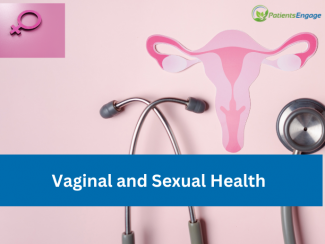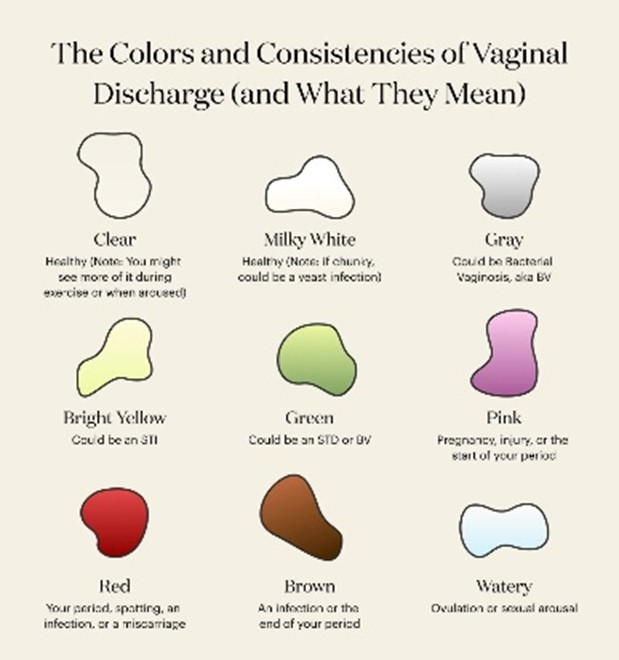
Sexual and vaginal health are vital to overall health of women. It starts with vaginal and sexual hygiene. Here is useful information that every woman must know and share with their daughters.
What is sexual health?
Sexual health is a state of physical, emotional, mental, and social well-being in relation to sexuality. It's not just the absence of disease or dysfunction but also includes the ability to have a positive and respectful approach to sexuality. Sexuality is a normal, positive, and lifelong aspect of health and well-being, and it encompasses more than our behaviours.
Sexual hygiene:
Before Sex:
- Washing the genital area with mild (unscented) soap and warm water before sex is recommended.
- Thorough handwashing is essential before any intimate contact as the hands touch many surfaces and may harbour unwanted bacteria and viruses.
- Using a water-based lubricant can help prevent friction and irritation during intercourse.
After Sex:
- Wash the external genital area with warm water, or a mild, pH-balanced cleanser. Avoid douching, as it can disrupt the natural balance of bacteria.
- Urinating after sex can help flush out bacteria that may have entered the urethra.
- Make sure the vaginal area is dry, pat the area dry with a soft towel.
- Choose cotton underwear to allow for breathability and minimize moisture buildup.
- Drinking plenty of water can help with overall vaginal health.
- If using any vibrators or such, clean them thoroughly after each use.
How to maintain good vaginal hygiene?
Maintaining proper vaginal hygiene helps prevent infections and maintain good health overall. Routine practice should include:
- Wash the vaginal area with warm water. Don’t use soaps or shower gels or any feminine hygiene products to cleanse the area as they may cause dryness, itching and irritation. The foaming agent (lauryl sulphate) causes the irritation.
- Avoid washing the vaginal area frequently as it creates disbalance of good bacteria. Rinse the area well and use an emollient (safe for daily use) after. If you have dry genital skin apply some emollient (can use coconut oil) before bed every night.
- Wear breathable cotton underwear (avoid tight-fitting clothing that can trap moisture and lead to irritation).
- Change sanitary products regularly during menstruation- (every 4-6 hours) to prevent bacterial growth and irritation.
- Avoid douching.
- Change out of sweaty clothes after exercise or other activities. Excessive sweating can contribute to bacterial growth.
- Regular screening for sexually transmitted diseases (STIs) is important, especially when engaging in sexual activity with new/untested partners.
Related Reading: Menstrual Hygiene Tips and Important Info
Is vaginal discharge normal?
Vaginal discharge (fluid coming out of the vagina) is considered normal as long as it is clear or white and does not have a strong odour. The vaginal walls are lined with cells that are arranged in multiple layers, forming the vaginal epithelium. Underneath the epithelium, the vaginal wall also contains connective tissue, smooth muscle, lymph vessels, and nerves. The vagina has many organisms, such as good bacteria, and yeast. Vaginal discharge helps maintain a balance of these organisms, by removing dead cells and preventing over-growth of any one bacteria or yeast. This keeps the vagina clean and healthy.
Closer to one’s menstrual period, the vaginal discharge becomes thicker, stickier and heavier which happens due to the monthly fluctuation of hormones.
Related Reading: Common Questions on Vaginal Health

https://philaholisticclinic.com/vaginal-discharge-leucorrhoea-types-cau…
What is abnormal vaginal discharge?
In case of abnormal vaginal discharge, one must always visit a gynecologist for examination. Here are some of the common causes of abnormal discharge:
White sticky discharge: Usually signifies an overgrowth of yeast, a fungus normally found in our bodies. A yeast infection also known as Vulvovaginal Candidiasis causes a cottage cheese-like discharge. Often associated with intense itching or burning in your vagina and vulva.
Clear discharge with foul or fishy odour: It happens when there is overgrowth of certain bacteria present in the vagina known as Bacterial Vaginosis.
Yellowish/Greenish Vaginal discharge: It may be associated with vaginal irritation, redness and swelling in the vulva and vaginal area and occurs due to a sexually transmitted infection (STI) known as Trichomoniasis. Other causes of yellowish vaginal discharge are Chlamydia and Gonorrhoea.
Vaginal itching and discomfort in perimenopausal women: Many women experience vaginal discomfort around the time of menopause (usually mid-forties but may start earlier). They may have a condition called genitourinary syndrome of menopause (GSM), also called vaginal atrophy (shrinking and thinning of the vaginal tissue). This is not an infection and is associated with changing hormonal levels.
How to prevent vaginal/sexually transmitted infections?
- Maintaining good vaginal hygiene is the most important step.
- Consuming probiotics like yogurt are known to help maintain the vaginal pH which in turn helps to prevent infections.
- Practicing safe sex, using barrier contraception like condoms/diaphragms helps to create a barrier thus preventing STIs.
- Getting vaccinated with the HPV vaccine also commonly known as the “Cervical cancer vaccine” helps prevent the harmful strain of the HPV virus which may cause cancer. The HPV vaccine is recommended for routine vaccination starting at age 11 or 12 but can be given as early as age 9. Before the age of 15, two doses are recommended, between 15 and 26 years, re three doses are usually recommended. The vaccine can be given up to age 45, but its effectiveness may be lower for those vaccinated later in life.
Read more about the HPV vaccine here: https://www.patientsengage.com/conditions/does-hpv-vaccination-prevent-…
- If you have any other disease like diabetes, keep your blood sugar levels under control.
- If you have a weakened immune system, due to conditions like HIV or medications, you have to be more cautious about hygiene and must see the doctor immediately for any signs of infection.
What to expect from the doctor when you visit for abnormal vaginal discharge?
A doctor would first ask a few questions about your menstrual cycle, sexual activity and any signs/symptoms experienced followed by an examination and tests.
Diagnosis: A doctor will likely perform a pelvic exam and may take samples of the discharge to identify the cause. They would do microscopy, pH testing, and sometimes a culture of the sample to identify the cause. Multiplex 7-PCR is ideal for screening women with recurrent/persistent vaginal discharge. Mycoplasma is the most common cause of persistent/recurrent vaginal.
Treatment: Treatment depends on the cause of the discharge and may include antibiotics, antifungal medications, or sometimes treatment for mixed infections. Recurrent infections may require longer or different treatment regimens.
References
- Abraham, Cynthia . “Think You Have a Vaginal Infection? Here’s What You Need to Know.” Www.acog.org, Aug. 2023, www.acog.org/womens-health/experts-and-stories/the-latest/think-you-hav….
- “Adolescent Health Care Resources for Teens.” Www.aap.org, www.aap.org/en/patient-care/adolescent-sexual-health/resources-for-adol….
- Better Health Channel. “Womens Sexual and Reproductive Health.” Vic.gov.au, 2012, www.betterhealth.vic.gov.au/campaigns/womens-sexual-and-reproductive-he….
- Cleveland Clinic. “Vaginal Yeast Infection: Causes, Symptoms & Treatment.” Cleveland Clinic, 2 Sept. 2022, my.clevelandclinic.org/health/diseases/5019-vaginal-yeast-infection.
- “GARDASIL®9 (Human Papillomavirus 9-Valent Vaccine, Recombinant) Dosing Schedule.” Gardasil9 Adolescent, www.gardasil9.com/patient-pd/what-is-gardasil-9/gardasil9-schedule/.
- “Genital Hygiene: Our Tips.” Devon Sexual Health, www.devonsexualhealth.nhs.uk/your-sexual-health/genital-hygiene-our-tip….
- “Good Sexual Hygiene: Here’s What to Know - Everlywell Blog | At-Home Health & Wellness Insights.” Everlywell.com, 2019, www.everlywell.com/blog/virtual-care/good-sexual-hygiene/?srsltid=AfmBO…. Accessed 5 Aug. 2025.
- Hamad, Youssef, et al. “Women with Persistent/Recurrent Vaginal Discharge Should Be Offered Multiplex-7 PCR Testing.” European Journal of Obstetrics & Gynecology and Reproductive Biology, vol. 306, Mar. 2025, pp. 54–59, https://doi.org/10.1016/j.ejogrb.2024.12.024. Accessed 29 Apr. 2025.
- “Redirect Notice.” Google.com, 2025, www.google.com/url?sa=i&url=https%3A%2F%2Fphilaholisticclinic.com%2Fvag…. Accessed 5 Aug. 2025.
- “Sexual Health: Risk and Protective Factors - ACT for Youth.” Actforyouth.org, 2025, actforyouth.org/adolescence/sexual-health/health/.






